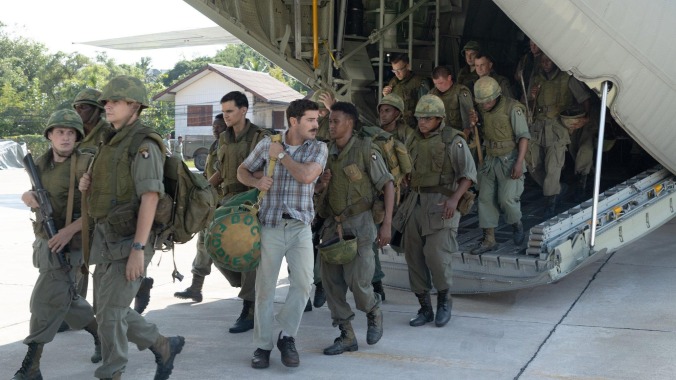In The Greatest Beer Run Ever, Peter Farrelly tells a true story drunk on simplistic messages
Even bolstered by Russell Crowe and Zac Efron as his leads, Green Book director Peter Farrelly doesn't tackle his second real-life tale with any more nuance
Film Reviews Peter Farrelly
There is an early scene early in The Greatest Beer Run Ever showing a peace protest against the Vietnam War, supposedly taking place in New York City, that encapsulates everything that is wrong with this movie. It looks like it was shot in a backyard. There’s no feel at all of the big city. The arguments presented by the characters on each side are broad and reductive. There’s no nuance and no original thoughts. The information is obvious and presented at its least confrontational. It’s a scene meant to depict the moral dilemma at the center of its story, and it ends up being ridiculous.
The Vietnam War is the backdrop of this madcap true story. The script, credited to Peter Farrelly, Pete Jones, and Brian Currie, which Farrelly directs, follows John “Chickie” Donohue (Zac Efron), a merchant marine whose biggest accomplishment—according to his father, anyway—is “sleeping until three in the afternoon” every day. While most of his neighborhood friends are fighting abroad, John decides (on a dare) to do something nice for them: he’ll travel to Vietnam to bring them some American beer and a little bit of cheer from home. Everyone expects it will be another drunken promise that’s forgotten in the morning, but to prove them all wrong, Chickie actually hops on a merchandise ship bound for Saigon.
He succeeds, managing to get to the frontline and deliver beer to most of his friends. In the process, his eyes are opened to the complexity of war beyond Americans fighting the good fight against communists. The resulting film throws everything at us that we expect: Chickie’s life in danger as he escapes enemy fire. A moment of mistaken identity where everyone he meets thinks he’s a CIA agent. A meeting with an older and wiser journalist (Russell Crowe), with whom he trades life lessons. Chickie’s no longer naive about the war, and the journalist becomes less cynical.
More egregious is the choice to feature just one Vietnamese character in a story set in Vietnam. Played by Kevin K. Tran, he’s a traffic cop that Chickie befriends and eventually invites to visit New York. Everything about him is a cliche. From the first scene to the last, you know where his story will end, and he behaves in all the ways that require the least effort from either the screenwriters or the audience. He’s amicable, friendly, and immediately accepting of Chickie, whose journey he serves without having one of his own. The film applauds Chickie for striking up a friendship with a Vietnamese man, and then applauds him again later for the lessons learned from that encounter.
With such a cliche-laden script, the actors get lost completely. Crowe gets asked to deliver banal and innocuous lines like “the truth doesn’t hurt us, it’s the lies,” expecting him to lend them enough gravitas to become the film’s main thesis—an impossible task. Efron manages to intermittently identify the humor that makes the character’s “noble but idiotic” mission believable. But when asked to communicate Chickie’s changed perspective about the war, his earnestness begins to grate.
Meanwhile, Bill Murray appears as a barman and WWII veteran longing for a morally unambiguous war like the one he fought in. The character is transparently supposed to represent the perspective of patriotic Americans, but like the demonstration mentioned at the beginning of this review, his pro-war dialogue is facile and everything he says is obvious. It’s as if the writers put his lines in as a placeholder until they could come up with something better, and then forgot to—or decided not to bother.
And yet, all of this speeds along quite smoothly. Like with Green Book, Farrelly hopes to tell an audience-friendly, feel-good story based on true events. But by doing that with this topic, he’s basically suggesting that everything is (or was) okay, and nothing’s wrong; let’s have some fun while ignoring history, politics, and the deeper structural issues within American society. Ultimately, there’s fun to mine from this material, but it requires the audience to abandon critical thinking and take what the film is saying at face value. By questioning nothing, Farrelly offers a demonstration of his own—namely, how not to treat a complex subject.